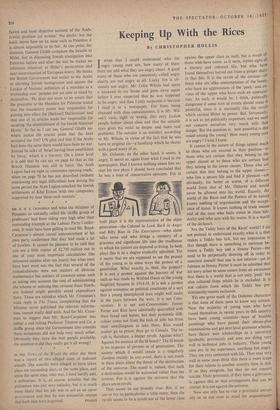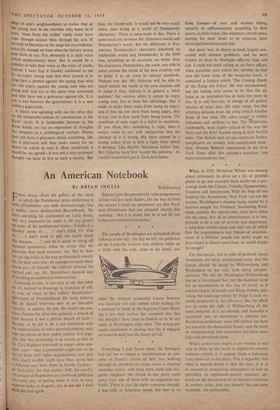Keeping Up With the Rices
By CHRISTOPHER HOLLIS I WISH that I could understand who the angry young men are, how many of them there are and what they are angry about. A good many of those who are commonly called angry clearly are not angry at all. Lucky Jim is ob- viously not angry. Mr. Colin Wilson had spent a weekend in my house and gone away again before I ever suspected that he was supposed to be angry, and then I only suspected it because I read it in a newspaper. Far from being obsessed with class consciousness, it is Mr. Wil- son's view, right or wrong, that only foolish people bother about class and that the sensible man gives his mind to deeper and more real problems. The outsider is an outsider, according to Mr. Wilson, in virtue of the fact that he was born in original sin—a handicap which he shares with a good many of us.
Mr.. Osborne, on the other hand, it seems, is angry. It seems so, again from what I read in the newspapers. Had I known nothing about him ex- cept his two plays I should have concluded that he was a man of conservative opinions. For in both plays it is the representative of the older generation—the Colonel in Look Back in Anger and Billy Rice in The Entertainer—who alone talks sense and who brings a memory of a gracious and significant life into the madhouse in which his juniors are depicted as living. In both plays this is to a degree explicitly admitted. Yet it seems that we are supposed to see the protest of the young as in some ways the protest of a generation. What exactly is, then, the protest? It is not a protest against the horrors of war such as was made by Wilfred Owen or the young Siegfried Sassoon in 1914-18. It is not a protest against economic or political conditions of a sort that a young unemployed man might well make in the years between the wars. It is not Com- munism. It is not anti-Communism. Jimmy Porter and Rice have admittedly quarrelled with their bread and butter, but their economic diffi- culties come not from the lack of jobs but from their unwillingness to take them. Rice would sooner go to prison than go to Canada. The re- volt is, therefore, a deeper revolt. Against what? Against the menace of the H-bomb? The H-bomb is no respecter of persons or of generations. The society which it would create is a singularly classless society. In any event, there is not much in these plays about the threat of the destruction of the universe. The mood is, indeed, that such a destruction would be welconied rather than the reverse. For it is against the universe that the plays are in revolt.
That seems to me broadly true. But, if we are to try to particularise a little more, then the revolt seems to be a revolt not of the lower class against the upper class as such, but a revolt of those who have come, as it were, within sight of a literary and cultured life, but who have found themselves barred out from a proper shar in that life. It is the revolt of the envious--0 those who arealike contemptuous of the lower who have no appreciation of the 'posh,' and en vious of the upper who have such an apprecia tion. As such, it would be, I think,- political! dangerous if some turn of events should make i powerful, since it is uncannily like the revol which carried Hitler to power. But, fortunately it is not as yet politically important, and we nee( not concern ourselves very much with tha danger. But the question is : how powerful is thi mood among the young? How many young me/ are angry? I wish I knew.
It cannot in the nature of things appeal mud' to those who are assured in their position—to those who are certain that they belong to tht upper classes or to those who are certain tha they belong to the lower classes. Those who ar certain that they belong to the upper classes— who live a secure life and find it pleasant—are obviously, for better or worse, of a differen world from that of Mr. Osborne and would never be allowed into his world. Equally, the world of the Rices and the Porters of its nature knows nothing of organisation and the accept ance of status. It knows nothing of trade union and of the man who finds virtue in class soli darity and who acts with his mates. It is a world of the declasses.
Are the Teddy boys of the Rices' world? I do not pretend to understand exactly what it is that makes a Teddy boy tick, but my impression i that though there is something in common be tween a Teddy boy and a Jimmy Porter—the need to be perpetually showing off in order to convince oneself that one is not inferior—yet in fairness to Jimmy Porter it must be admitted tha his envy arises to some extent from an awareness that there is a world that is not only 'posh' bu also cultured. from which he is excluded. It is not culture from which the Teddy boy pre dominantly resents exclusion.
Yet one great mark of the Osborne characters is that none of them seem to know any science Now the majority of young men who have raised themselves in recent years in this country have been young scientists—boys of humble parentage who have passed their eleven-plus examinations and got into local grammar schools have thence won scholarships to a university (probably provincial) and now are doing very well in technical jobs in industry. These young men are, in my experience, anything but angry. They are very contented with life. They may very well in some cases think that there is more scope for their talents in another country than in this. If so they emigrate, but they do not commit suicide. Their grievance, if they have a grievance, is against this or that arrangement that can be altered. It is not against the universe.
Now one only has to visit a provincial univer• sity or to run over in mind the acquaintance-
;
Ships of one's neighbourhood to realise that of the young men in the twenties who have, as it were, `risen from the ranks,' vastly more have risen through science than through the arts. If We look to literature or the stage for our evidence, naturally enough we hear what the literary young men have to say. For obviously it is their voice Which predominates there. But it would be a mistake to take their voice as the voice of youth. Indeed, I have had it frankly confessed to me by an angry young man that their protest is in large part a protest against the young men who are not angry, against the young men who are doing well and are at the same time contented and who have not a grievance against life. It is not a war between the generations; it is a war Within a generation.
A friend was agreeing with me the other day O n the intolerable tedium of conversation in the Rices' circle. It is intolerable because to the Rices words are not an expression of thoughts but weapons in a pathological warfare. Phcebe does not have a grievance about something. She has a grievance and then looks round for an Object on which to vent it. How intolerable it Would be, we agreed—it was not a very profound thought—to have to live in such a society. But
then, my friend said, 'it would not be very much worse than living in a world of Dostoievsky characters.' There is some truth in this. There is some similarity between Mr. Osborne's world and Dostoievsky's world. But the difference is that, whereas Dostoievsky's characters inhabited an intolerable world and Dostoievsky in the flesh was, according to all accounts, no better than his characters, Dostoievsky, the artist, was able to stand outside the world of his own creation and to judge it as an artist by eternal standards. Perhaps one day Mr. Osborne will be able to stand outside the world of his own creation and to judge it thus. Success is in general a `bitch goddess,' but success, when it comes to angry young men, has at least this advantage, that it tends to make them cease from being so angry; and if they do not cease from being angry, they at any rate in time cease from being young. The condition of sane anger is a belief in standards. If you think that something is right, then • it makes sense to say with indignation that the absence of it is wrong. But there cannot be a wrong unless there is first a right from which it deviates. Like Harriet Martineau before him, Mr. Osborne must first 'accept the universe.' As Carlyle would have put it, 'Gad, he'd better.'



































 Previous page
Previous page